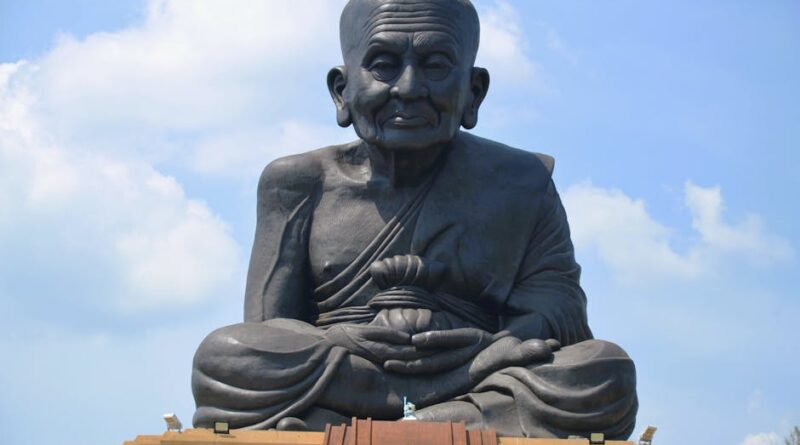The Importance of Spiritual Retreats: Nourishing the Soul and Embracing Inner Growth
Are you feeling overwhelmed by the hustle and bustle of daily life? Do you find yourself yearning for a moment of peace and introspection? In the midst of our fast-paced world, the concept of spiritual retreats offers a sanctuary for individuals seeking solace, reflection, and renewal. These retreats provide a unique opportunity to disconnect from the distractions of modern life and reconnect with oneself on a deeper level. In this article, we will delve into the significance of spiritual retreats, exploring their profound impact on mental, emotional, and spiritual well-being.
The Roots of Spiritual Retreats: A Historical Perspective

By Nate Biddle via Pexels
Throughout history, spiritual retreats have played a significant role in various religious and philosophical traditions. The practice of retreating from the world to focus on spiritual development dates back centuries, with roots in ancient Eastern and Western philosophies. In the Christian tradition, monastic retreats have long been a cornerstone of spiritual growth, providing monks and nuns with a respite from worldly distractions to deepen their connection with God. Similarly, in Eastern traditions such as Buddhism and Hinduism, retreats are seen as a vital component of the spiritual path, allowing practitioners to cultivate mindfulness, insight, and inner peace.
Today, the concept of spiritual retreats has evolved beyond religious boundaries, attracting individuals from all walks of life who are seeking a space for introspection, reflection, and self-discovery. Whether it’s a silent meditation retreat, a yoga retreat in nature, or a mindfulness retreat in a tranquil setting, the essence remains the same: to withdraw from the external world and journey inward to explore the depths of one’s being.
The Benefits of Spiritual Retreats: Nurturing Mind, Body, and Spirit

By Min An via Pexels
The benefits of spiritual retreats are multifaceted, encompassing mental, emotional, and spiritual dimensions. By stepping away from the demands of everyday life and immersing oneself in a retreat environment, individuals can experience a profound sense of relaxation, rejuvenation, and clarity. Here are some key benefits of embarking on a spiritual retreat:
1. Rest and Rejuvenation
One of the primary benefits of a spiritual retreat is the opportunity to rest and recharge both physically and mentally. In our fast-paced world, where stress and busyness have become the norm, taking time out to relax and rejuvenate is essential for overall well-being. Retreats offer a peaceful and nurturing environment where individuals can unwind, de-stress, and replenish their energy reserves.
2. Self-Reflection and Personal Growth
Spiritual retreats provide a space for self-reflection and introspection, allowing individuals to gain insight into their thoughts, emotions, and beliefs. By stepping back from the distractions of daily life, participants can explore their inner landscape, confront unresolved issues, and cultivate a deeper understanding of themselves. This process of self-discovery often leads to personal growth, increased self-awareness, and a renewed sense of purpose.
3. Connection with Nature
Many spiritual retreats are held in natural settings such as mountains, forests, or by the sea, allowing participants to connect with the beauty and tranquility of the natural world. Immersing oneself in nature can have a profound effect on mental and emotional well-being, reducing stress, anxiety, and depression. The healing power of nature is well-documented, with studies showing that spending time in natural environments can lower blood pressure, boost mood, and enhance overall health.
4. Spiritual Renewal and Deepening of Faith
For those with a religious or spiritual inclination, retreats provide an opportunity to deepen their connection with their faith and cultivate a sense of spiritual renewal. Whether through prayer, meditation, chanting, or contemplation, retreatants can engage in spiritual practices that nourish their soul and strengthen their relationship with the divine. Retreats often serve as a sacred space where individuals can seek guidance, inspiration, and solace in their spiritual journey.
5. Community and Support
Spiritual retreats offer a sense of community and support that can be lacking in everyday life. By participating in a retreat, individuals have the opportunity to connect with like-minded souls, share their experiences, and receive encouragement and guidance from teachers and fellow participants. This sense of belonging and camaraderie can be profoundly healing and uplifting, fostering a sense of unity and connection among retreatants.
Types of Spiritual Retreats: Exploring Diverse Paths to Inner Peace

By Noelle Otto via Pexels
There is a wide variety of spiritual retreats available to suit different preferences, interests, and spiritual beliefs. From silent meditation retreats to yoga retreats, mindfulness retreats, and nature retreats, each offers a unique approach to inner growth and self-discovery. Here are some popular types of spiritual retreats:
1. Silent Meditation Retreats
Silent meditation retreats focus on cultivating mindfulness, concentration, and awareness through the practice of silent sitting meditation. Participants typically spend extended periods in silence, meditating for several hours each day, with guidance from experienced teachers. These retreats provide a conducive environment for deepening one’s meditation practice, quieting the mind, and cultivating inner peace.
2. Yoga Retreats
Yoga retreats combine the practice of yoga asanas (postures), pranayama (breath control), and meditation in a serene and supportive environment. Participants have the opportunity to deepen their yoga practice, enhance flexibility and strength, and cultivate a sense of inner balance and harmony. Yoga retreats often include guided meditation, mindfulness practices, and workshops on yoga philosophy and lifestyle.
3. Mindfulness Retreats
Mindfulness retreats focus on the practice of mindfulness, which involves paying attention to the present moment with curiosity and non-judgment. Participants learn to develop awareness of their thoughts, emotions, and bodily sensations, cultivating a sense of clarity, acceptance, and equanimity. Mindfulness retreats often include guided meditation, mindful movement practices, and teachings on how to integrate mindfulness into daily life.
4. Nature Retreats
Nature retreats offer participants the opportunity to immerse themselves in the healing power of the natural world. These retreats are often held in remote and pristine locations, such as national parks, mountains, or eco-friendly retreat centers. Participants can engage in outdoor activities such as hiking, birdwatching, or forest bathing, reconnecting with nature and experiencing a sense of awe and wonder.
Expert Opinions: Insights from Spiritual Leaders and Teachers
According to renowned spiritual teacher Eckhart Tolle, Retreats are a way to step out of the stream of the world and give yourself the gift of attending to your own well-being. Tolle emphasizes the importance of taking time for inner reflection and self-care, highlighting the transformative power of retreats in cultivating presence and awareness.
Spiritual leader Thich Nhat Hanh also extols the virtues of retreats, stating, When we go on retreat, we can experience the miracle of mindfulness, which can help us touch the wonders of life within and around us. Hanh emphasizes the role of mindfulness in deepening our connection with the present moment and fostering a sense of peace and joy.
Common Misconceptions About Spiritual Retreats: Debunking Myths
Despite the numerous benefits of spiritual retreats, there are several common misconceptions that may deter individuals from embarking on this transformative journey. Let’s debunk some of the myths associated with spiritual retreats:
1. Spiritual retreats are only for religious people.
While some retreats may have a religious or spiritual focus, many are secular and open to individuals of all backgrounds and beliefs. Retreats are about inner growth, self-discovery, and personal transformation, regardless of one’s religious affiliation.
2. Retreats are only for experienced practitioners.
Retreats cater to individuals of all levels, from beginners to advanced practitioners. Whether you’re new to meditation, yoga, or mindfulness, or have been practicing for years, there are retreats designed to meet your needs and support your journey.
Conclusion: Embracing the Transformative Power of Spiritual Retreats
In conclusion, spiritual retreats offer a profound opportunity for individuals to pause, reflect, and nourish their soul. By stepping away from the distractions of daily life and immersing oneself in a retreat environment, one can experience a deep sense of peace, rejuvenation, and spiritual growth. Whether it’s a silent meditation retreat, a yoga retreat in nature, or a mindfulness retreat by the sea, the benefits of spiritual retreats are far-reaching and transformative. As we navigate the complexities of modern life, the importance of spiritual retreats becomes increasingly evident in helping us reconnect with our innermost selves and embrace the beauty of the present moment.
To wrap things up, consider embarking on a spiritual retreat as a gift to yourself, a sacred journey of self-discovery and renewal. Allow yourself the space and time to explore the depths of your being, connect with your inner wisdom, and cultivate a sense of peace and harmony that will reverberate through every aspect of your life. The path to spiritual growth begins with a single step will you take that step today?




